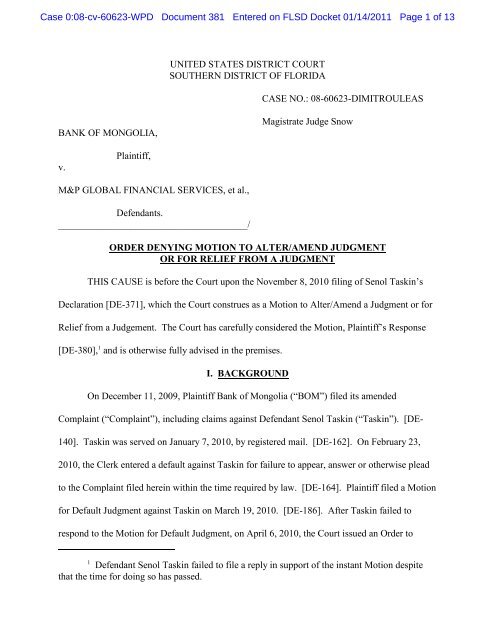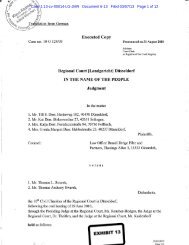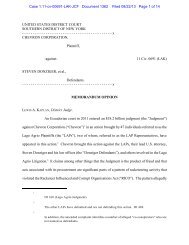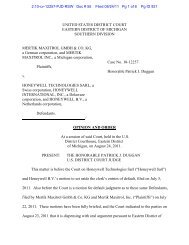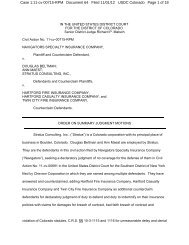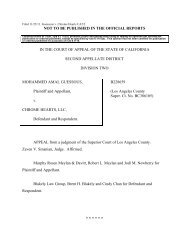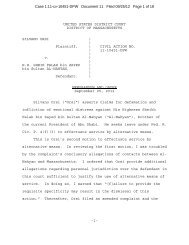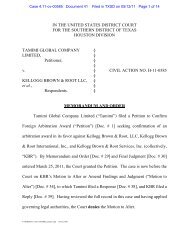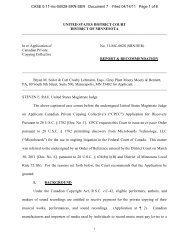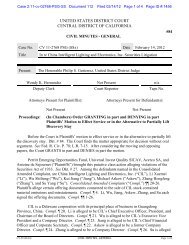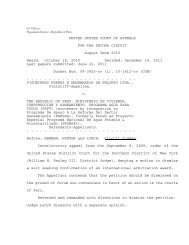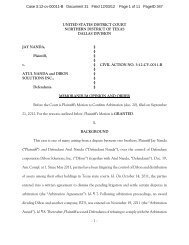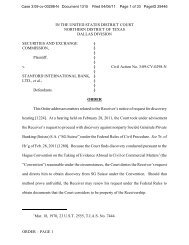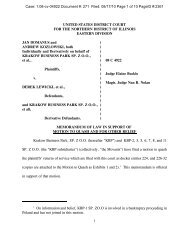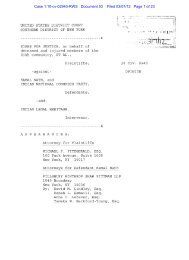denied the motion - Letters Blogatory
denied the motion - Letters Blogatory
denied the motion - Letters Blogatory
You also want an ePaper? Increase the reach of your titles
YUMPU automatically turns print PDFs into web optimized ePapers that Google loves.
Case 0:08-cv-60623-WPD Document 381 Entered on FLSD Docket 01/14/2011 Page 1 of 13<br />
BANK OF MONGOLIA,<br />
v.<br />
Plaintiff,<br />
UNITED STATES DISTRICT COURT<br />
SOUTHERN DISTRICT OF FLORIDA<br />
M&P GLOBAL FINANCIAL SERVICES, et al.,<br />
Defendants.<br />
_______________________________________/<br />
CASE NO.: 08-60623-DIMITROULEAS<br />
Magistrate Judge Snow<br />
ORDER DENYING MOTION TO ALTER/AMEND JUDGMENT<br />
OR FOR RELIEF FROM A JUDGMENT<br />
THIS CAUSE is before <strong>the</strong> Court upon <strong>the</strong> November 8, 2010 filing of Senol Taskin’s<br />
Declaration [DE-371], which <strong>the</strong> Court construes as a Motion to Alter/Amend a Judgment or for<br />
Relief from a Judgement. The Court has carefully considered <strong>the</strong> Motion, Plaintiff’s Response<br />
1<br />
[DE-380], and is o<strong>the</strong>rwise fully advised in <strong>the</strong> premises.<br />
I. BACKGROUND<br />
On December 11, 2009, Plaintiff Bank of Mongolia (“BOM”) filed its amended<br />
Complaint (“Complaint”), including claims against Defendant Senol Taskin (“Taskin”). [DE-<br />
140]. Taskin was served on January 7, 2010, by registered mail. [DE-162]. On February 23,<br />
2010, <strong>the</strong> Clerk entered a default against Taskin for failure to appear, answer or o<strong>the</strong>rwise plead<br />
to <strong>the</strong> Complaint filed herein within <strong>the</strong> time required by law. [DE-164]. Plaintiff filed a Motion<br />
for Default Judgment against Taskin on March 19, 2010. [DE-186]. After Taskin failed to<br />
respond to <strong>the</strong> Motion for Default Judgment, on April 6, 2010, <strong>the</strong> Court issued an Order to<br />
1 Defendant Senol Taskin failed to file a reply in support of <strong>the</strong> instant Motion despite<br />
that <strong>the</strong> time for doing so has passed.
Case 0:08-cv-60623-WPD Document 381 Entered on FLSD Docket 01/14/2011 Page 2 of 13<br />
Show Cause [DE-217], requiring Taskin to file a Response to <strong>the</strong> Motion for Default Judgment<br />
on or before April 16, 2010. The Court fur<strong>the</strong>r indicated that a failure to timely respond would<br />
result in <strong>the</strong> immediate entry of a default judgment. Taskin failed to respond to <strong>the</strong> Order to<br />
Show Cause.<br />
As such, on April 19, 2010, pursuant to Rule 58(a) a separate final judgment (“Final<br />
Judgment”) was entered against Taskin [DE-236], with <strong>the</strong> Court referring <strong>the</strong> matter to United<br />
States Magistrate Judge Lurana S. Snow for an evidentiary hearing on <strong>the</strong> amount of damages<br />
and for appropriate disposition or report and recommendation. On October 12, 2010, Magistrate<br />
Judge Snow issued a Report and Recommendation [DE-364], recommending judgment in <strong>the</strong><br />
amount of $67,639,921.62 against Taskin. Taskin never objected to <strong>the</strong> Report and<br />
Recommendation. On November 1, 2010, <strong>the</strong> Court adopted <strong>the</strong> Report and Recommendation<br />
and determined that judgment in <strong>the</strong> amount of $67,639,921.62 be entered against Taskin. [DE-<br />
370]. Thereafter, on November 9, 2010, Taskin submitted <strong>the</strong> instant Motion.<br />
II. DISCUSSION<br />
While <strong>the</strong> basis for <strong>the</strong> instant Motion is far from clear, importantly, Taskin does not<br />
appear to be objecting to <strong>the</strong> Court’s November 1, 2010 Order adopting <strong>the</strong> Report and<br />
Recommendation. Notably, <strong>the</strong> Motion was signed by Taskin on October 22, 2010, before <strong>the</strong><br />
November 1, 2010 Order was even issued by <strong>the</strong> Court. Instead, Taskin seems to be requesting<br />
that <strong>the</strong> Court disturb <strong>the</strong> Final Judgment entered on April 19, 2010. Specifically, Taskin appears<br />
to be trying to attack <strong>the</strong> Final Judgment on <strong>the</strong> grounds that this Court lacks subject matter<br />
jurisdiction over this case, that Taskin is not subject to <strong>the</strong> personal jurisdiction of this Court,<br />
2
Case 0:08-cv-60623-WPD Document 381 Entered on FLSD Docket 01/14/2011 Page 3 of 13<br />
that venue is improper, that service was improper, and that <strong>the</strong> Complaint fails to state a claim<br />
upon which relief can be granted.<br />
BOM responds to <strong>the</strong> instant Motion by arguing that to <strong>the</strong> extent <strong>the</strong> instant Motion is<br />
one to alter/amend <strong>the</strong> Final Judgment it is untimely and should be dismissed. The Court agrees.<br />
A review of <strong>the</strong> docket makes clear that a separate Final Judgment pursuant to Rule 58(a) was<br />
entered against Taskin in this matter on April 19, 2010, and, <strong>the</strong>refore, Taskin’s Motion – filed<br />
some seven months after entry of <strong>the</strong> Final Judgment – is far outside of <strong>the</strong> 28-day limit for filing<br />
<strong>motion</strong>s to alter or amend as provided in Federal Rule of Civil Procedure 59(e). See Fed. R. Civ.<br />
P. 59(e) (“A <strong>motion</strong> to alter or amend a judgment must be filed no later than 28 days after <strong>the</strong><br />
entry of <strong>the</strong> judgment.”).<br />
Next, BOM argues that to <strong>the</strong> extent <strong>the</strong> Motion is one for relief from judgment under<br />
Rule 60(b), <strong>the</strong> Motion also fails. Federal Rule of Civil Procedure 60(b) provides that<br />
On <strong>motion</strong> and just terms, <strong>the</strong> court may relieve a party or its legal representative<br />
from a final judgment, order, or proceeding for <strong>the</strong> following reasons: (1) mistake,<br />
inadvertence, surprise, or excusable neglect; (2) newly discovered evidence that,<br />
with reasonable diligence, could not have been discovered in time to move for a<br />
new trial under Rule 59(b); (3) fraud (whe<strong>the</strong>r previously called intrinsic or<br />
extrinsic), misrepresentation, or misconduct by an opposing party; (4) <strong>the</strong><br />
judgment is void; (5) <strong>the</strong> judgment has been satisfied, released or discharged; it is<br />
based on an earlier judgment that has been reversed or vacated; or applying it<br />
prospectively is no longer equitable; or (6) any o<strong>the</strong>r reason that justifies relief.<br />
Fed. R. Civ. Pro. 60(b). Fur<strong>the</strong>r, <strong>the</strong> Federal Rules provide that a “<strong>motion</strong> under Rule 60(b) must<br />
be made within a reasonable time . . .” Fed. R. Civ. Pro. 60(c).<br />
Rule 60(b) <strong>motion</strong>s are committed to <strong>the</strong> district court’s sound discretion and should be<br />
construed in order to do substantial justice, but “[t]he desirability for order and predictability in<br />
<strong>the</strong> judicial process speaks for caution in <strong>the</strong> reopening of judgments.” Griffin v. Swim-Tech<br />
3
Case 0:08-cv-60623-WPD Document 381 Entered on FLSD Docket 01/14/2011 Page 4 of 13<br />
Corp., 722 F.2d 677, 680 (11th Cir. 1984). To this end, Rule 60(b) “must be carefully<br />
interpreted to preserve <strong>the</strong> delicate balance between <strong>the</strong> sanctity of final judgments and <strong>the</strong><br />
‘incessant command of <strong>the</strong> court’s conscience that justice be done in light of all <strong>the</strong> facts.’” Id.<br />
(internal citations omitted). Thus, to prevail, a party “must demonstrate a justification so<br />
compelling that <strong>the</strong> district court [is] required to vacate its order.” Thompson v. Hicks, 213 Fed.<br />
Appx. 939, 941 (11th Cir. 2007) (internal citations omitted). BOM argues that of <strong>the</strong> reasons<br />
listed in Rule 60(b) only mistake, inadvertence, surprise or excusable neglect under (b)(1) or that<br />
<strong>the</strong> judgment is void under (b)(4) could apply to <strong>the</strong> instant Motion. Regardless, BOM argues<br />
that nei<strong>the</strong>r of <strong>the</strong>se grounds justify <strong>the</strong> extraordinary remedy of setting aside <strong>the</strong> default<br />
judgment against Taskin.<br />
A. Mistake, Inadvertence, Surprise or Excusable Neglect<br />
First, BOM argues that Taskin has failed to assert any “good reason” for his failure to<br />
respond to <strong>the</strong> Complaint in order to set aside <strong>the</strong> Final Judgment under Rule 60(b)(1). The<br />
Eleventh Circuit explained that in order to have <strong>the</strong> default judgment set aside on <strong>the</strong> basis of<br />
excusable neglect, <strong>the</strong> party “must show that it had a meritorious defense, that [<strong>the</strong> plaintiff]<br />
would not be prejudiced if <strong>the</strong> judgment were set aside, and that it had a ‘good reason’ for failing<br />
to respond to [<strong>the</strong> plaintiff’s] complaint.” Sloss Indus. Corp. v. Eurisol, 488 F.3d 922, 934 (11 th<br />
Cir. 2007) (internal citations omitted). The Eleventh Circuit continued that <strong>the</strong> “longer a<br />
defendant-even a foreign defendant-delays in responding to a complaint, <strong>the</strong> more compelling <strong>the</strong><br />
reason it must provide for its inaction when it seeks to set aside a default judgment.” Id. at 935.<br />
BOM points out that Taskin’s Motion makes clear that he received <strong>the</strong> Summons and<br />
Complaint in January of 2010, as Taskin indicates that “no receipt card (form 16A) was included<br />
4
Case 0:08-cv-60623-WPD Document 381 Entered on FLSD Docket 01/14/2011 Page 5 of 13<br />
with <strong>the</strong> registered mail or returned to Plaintiff.” [DE-371, 22]. Fur<strong>the</strong>r Taskin indicates he<br />
consulted a lawyer in Canada and <strong>the</strong> exhibits included with <strong>the</strong> Motion were clearly attested to<br />
as of January 25, 2010. As such, BOM argues that by January 25, 2010, Taskin had <strong>the</strong><br />
opportunity to consult Canadian counsel and execute affidavits about service, but none<strong>the</strong>less<br />
deliberately waited until November 9, 2010 to file <strong>the</strong> instant Motion. BOM also points out that<br />
<strong>the</strong> Motion is devoid of any details as to why Taskin failed to make a limited appearance to raise<br />
objections to <strong>the</strong> Complaint or as to when he learned of <strong>the</strong> initial default and Final Judgment.<br />
BOM argues that Taskin’s purposeful delay in seeking relief from <strong>the</strong> Final Judgment and<br />
willful failure to answer <strong>the</strong> complaint and <strong>motion</strong> for default judgment does not justify <strong>the</strong><br />
extraordinary remedy contemplated under Rule 60(b). Instead, BOM argues that Taskin’s<br />
culpable conduct is responsible for <strong>the</strong> entry of <strong>the</strong> Final Judgment. See Direct Mail Specialists,<br />
th<br />
Inc. v. Eclat Computerized Techs., Inc., 840 F.2d 685, 690 (9 Cir. 1988) (refusing to vacate <strong>the</strong><br />
default judgment and concluding that if <strong>the</strong> “defendant ‘has received actual or constructive notice<br />
of <strong>the</strong> filing of <strong>the</strong> action and failed to answer’ his conduct is culpable”).<br />
The Court agrees. Federal Rule of Civil Procedure 60(c) specifically provides that a<br />
“<strong>motion</strong> under Rule 60(b) must be made within a reasonable time . . .” In determining whe<strong>the</strong>r a<br />
Rule 60(b) <strong>motion</strong> is filed within a reasonable time, courts consider if <strong>the</strong> opposing party has<br />
been prejudiced by <strong>the</strong> delay and whe<strong>the</strong>r a good reason has been presented for failing to take<br />
action sooner. BUC Int’l Corp. v. Int’l Yacht Council Ltd., 517 F.3d 1271, 1275 (11th Cir.<br />
2008). Taskin has offered no evidence whatsoever here that he acted with due diligence or<br />
presented some good reason as to why he waited ten months after service of <strong>the</strong> Summons and<br />
Complaint and seven months after entry of <strong>the</strong> Final Judgment to raise his objections to this<br />
5
Case 0:08-cv-60623-WPD Document 381 Entered on FLSD Docket 01/14/2011 Page 6 of 13<br />
action. On <strong>the</strong> contrary, as pointed out by BOM, Taskin’s Motion makes clear that he was aware<br />
of <strong>the</strong> Summons and Complaint in January of 2010, consulted a lawyer, and obtained affidavits<br />
about service on January 25, 2010. Instead of timely objecting to this action within a reasonable<br />
period, Taskin elected to wait until November 9, 2010 to respond in any manner to <strong>the</strong><br />
Complaint. Taskin did so at his own peril. While Taskin delayed, Final Judgment was entered<br />
against him and this entire action was fully resolved and, thus, relief from <strong>the</strong> Final Judgment<br />
now would greatly prejudice BOM. Based upon this evidence, <strong>the</strong> Court is not persuaded that<br />
Taskin is entitled to <strong>the</strong> extraordinary remedy of relief from <strong>the</strong> Final Judgment under Rule<br />
60(b)(1) since he failed to file <strong>the</strong> instant Motion within a reasonable time.<br />
2<br />
B. Judgment is Void<br />
BOM argues that <strong>the</strong> entry of <strong>the</strong> Final Judgment was not void such that Rule 60(b)(4)<br />
has no application here. “Federal courts considering Rule 60(b)(4) <strong>motion</strong>s that assert a<br />
judgment is void because of a jurisdictional defect generally have reserved relief only for <strong>the</strong><br />
exceptional case in which <strong>the</strong> court that rendered judgment lacked even an ‘arguable basis’ for<br />
jurisdiction.” United States Aid Funds, Inc. v. Espinosa, 130 S.Ct. 1367, 1377 (2010). BOM<br />
argues that Taskin’s conclusory and self-serving statements regarding jurisdiction and service do<br />
not support a finding that <strong>the</strong> Court lacked an arguable basis for jurisdiction and, <strong>the</strong>refore, <strong>the</strong><br />
Final Judgment is not void and <strong>the</strong> instant Motion should be <strong>denied</strong>.<br />
2<br />
The Eleventh Circuit concluded that a Rule 60(b)(4) <strong>motion</strong> raising a jurisdictional<br />
defect in <strong>the</strong> judgment is not subject to Rule 60(c)’s reasonable time limitation. See Wattleton v.<br />
th<br />
U.S., 384 Fed. Appx. 907, 908 (11 Cir. 2010). As such, since Taskin has raised purported<br />
jurisdictional defects in <strong>the</strong> instant Motion, <strong>the</strong> Court will address Taskin’s Rule 60(b)(4)<br />
arguments in turn.<br />
6
Case 0:08-cv-60623-WPD Document 381 Entered on FLSD Docket 01/14/2011 Page 7 of 13<br />
i. Lack of Subject Matter Jurisdiction<br />
Taskin argues that <strong>the</strong> Court lacks subject matter jurisdiction as <strong>the</strong>re is no claim under<br />
Federal Law. In response, BOM argues that Counts I and II of <strong>the</strong> Complaint show that BOM<br />
was defrauded by Defendants, including Taskin, individually and jointly, in violation of <strong>the</strong><br />
federal RICO statute, 18 U.S.C. § 1961, et seq. Additionally, BOM argues that this Court has<br />
subject matter jurisdiction over <strong>the</strong> state law claims pursuant to 28 U.S.C. § 1367(a). To <strong>the</strong><br />
extent that Taskin is attempting to argue that BOM cannot bring its RICO claims because BOM<br />
is not chartered or registered in <strong>the</strong> U.S., none of its actions took place in <strong>the</strong> U.S., and no harm<br />
was done to any citizen or business in <strong>the</strong> U.S. [DE-371, 10], BOM argues that <strong>the</strong> Eleventh<br />
Circuit has held that <strong>the</strong> RICO act may apply extraterritorially “if conduct material to <strong>the</strong><br />
completion of <strong>the</strong> racketeering occurs in <strong>the</strong> United States, or if significant effects of <strong>the</strong><br />
racketeering are felt here.” Liquidation Com’n of Banco Intercontinental, S.A. v. Renta, 530 F.3d<br />
th<br />
1339, 1351-52 (11 Cir. 2008).<br />
Again, <strong>the</strong> Court agrees with BOM. Consistent with <strong>the</strong> Court’s previous Order Denying<br />
Motion to Dismiss [DE-334], <strong>the</strong> Court finds that BOM has plausibly alleged significant<br />
amounts of conduct by <strong>the</strong> Defendants in fur<strong>the</strong>rance of <strong>the</strong> RICO conspiracy in <strong>the</strong> U.S. for this<br />
Court to have subject matter jurisdiction over <strong>the</strong> action. The Court finds Taskin’s arguments<br />
regarding lack of subject matter jurisdiction to be without merit and, <strong>the</strong>refore, such arguments<br />
do not entitle Taskin to relief from judgment under Rule 60(b)(4).<br />
ii. Lack of Personal Jurisdiction<br />
Taskin also argues that he is not subject to <strong>the</strong> personal jurisdiction of this Court. In<br />
response, BOM argues that <strong>the</strong> exercise of personal jurisdiction comports with due process when<br />
7
Case 0:08-cv-60623-WPD Document 381 Entered on FLSD Docket 01/14/2011 Page 8 of 13<br />
“(1) <strong>the</strong> nonresident defendant has purposefully established minimum contacts with <strong>the</strong> forum . .<br />
. and (2) <strong>the</strong> exercise of jurisdiction will not offend traditional notions of fair play and substantial<br />
th<br />
justice.” U.S. SEC v. Carrillo, 115 F.3d 1540, 1542 (11 Cir. 1997) (internal citations omitted).<br />
BOM argues that this Court has personal jurisdiction over Taskin because BOM’s cause<br />
of action arises from or is directly related to Taskin’s contacts with <strong>the</strong> U.S., and with Florida in<br />
particular. In contradiction to Taskin’s conclusory statements, BOM offers <strong>the</strong> following<br />
evidence of Taskin’s contacts with <strong>the</strong> U.S. and Florida: (1) although Taskin stated he visited<br />
Florida only once on personal business, Defendant Suzanne Greenberg testified that Taskin<br />
visited <strong>the</strong> office of <strong>the</strong> Defendants in Florida on several occasions [DE-380-5]; (2) although<br />
Taskin contends he does not have a bank account in Florida, Defendant Suzanne Greenberg<br />
testified that Taskin had one account that was used for transactions involving M&P [DE-380-5,<br />
380-6]; (3) while Taskin claims he never conducted any business in Florida, Defendant Burton<br />
Greenberg introduced Taskin to o<strong>the</strong>rs as an officer of M&P [DE-380-7] and Taskin spent a large<br />
amount of time working for M&P Global, a Florida corporation [DE-380-8]; (4) while Taskin<br />
contends he did not know he was an officer of GT International Holdings, BOM argues that this<br />
assertion is incredulous given that <strong>the</strong> papers listing Taskin as an officer were signed by Taskin’s<br />
close associate Joel Greenberg, <strong>the</strong> documents listing Taskin as an officer were publically listed,<br />
and Taskin used a GT International email address to conduct business from 2008 onwards [DE-<br />
380-9, 380-10, 380-11]; and (5) while Taskin contends he is not subject to taxation in <strong>the</strong> United<br />
States, BOM argues that this fact is far from certain since Taskin was listed as an officer of GT<br />
International, was held out as a Director of M&P Global and received income in connection with<br />
his work for <strong>the</strong>se entities [DE-380-5, 380-6, 380-12]. BOM argues that since <strong>the</strong> federal RICO<br />
8
Case 0:08-cv-60623-WPD Document 381 Entered on FLSD Docket 01/14/2011 Page 9 of 13<br />
statute authorizes nationwide service of process, <strong>the</strong> proper forum for minimum contacts analysis<br />
is <strong>the</strong> United States. BOM argues that Taskin has sufficient minimum contacts with Florida<br />
specifically and <strong>the</strong> United States generally to be subject to this Court’s jurisdiction.<br />
The Court agrees with BOM. Given this evidence, <strong>the</strong> Court is persuaded that Taskin has<br />
sufficient minimum contacts with Florida and <strong>the</strong> United States such that <strong>the</strong> exercise of personal<br />
jurisdiction over Taskin would not offend <strong>the</strong> Due Process Clause. Taskin’s conduct manifested<br />
a continual course of business dealings with <strong>the</strong> o<strong>the</strong>r Defendants in Florida over a period of<br />
several years that relates directly to BOM’s claims in <strong>the</strong> Complaint such that Taskin availed<br />
himself of <strong>the</strong> privilege of conducting activities in Florida and reasonably could have anticipated<br />
being sued here. Consequently, <strong>the</strong> Court finds that <strong>the</strong> exercise of personal jurisdiction over<br />
Taskin would not offend traditional notions of fair play and substantial justice and that Taskin is<br />
not entitled to relief from judgment under Rule 60(b)(4) on this ground.<br />
iii. Improper Venue<br />
Taskin argues that venue is improper since he does not reside in this district and no part<br />
of <strong>the</strong> events and omissions giving rise to <strong>the</strong> claim occurred in this district. BOM points to 28<br />
U.S.C. § 1391(b)(2)-(3) which provides that a civil action not founded solely on diversity of<br />
citizenship may be brought in a judicial district where “a substantial part of <strong>the</strong> events or<br />
omissions giving rise to <strong>the</strong> claim occurred.” BOM points to fact that Taskin’s associates in <strong>the</strong><br />
RICO enterprise are located in Florida and all of <strong>the</strong> Defendants sent mails, made phone calls,<br />
and o<strong>the</strong>rwise directed and participated in <strong>the</strong> fraudulent scheme from <strong>the</strong>ir homes or offices in<br />
Florida. [DE-297, 36, 42]. As such, BOM argues that <strong>the</strong> conduct material to <strong>the</strong> completion<br />
of <strong>the</strong> racketeering scheme against BOM occurred in Florida such that venue is proper. Fur<strong>the</strong>r,<br />
9
Case 0:08-cv-60623-WPD Document 381 Entered on FLSD Docket 01/14/2011 Page 10 of 13<br />
BOM argues that “if a party is in default by failing to appear or to file a responsive pleading,<br />
defects in venue are waived, a default judgment may be validly entered and <strong>the</strong> judgment cannot<br />
be attacked collaterally for improper venue.” Williams v. Life Sav. & Loan, 802 F.2d 1200, 1202<br />
th (10 Cir. 1986). “Defects in venue do not affect <strong>the</strong> court’s power and a valid default judgment<br />
may be entered by a court notwithstanding <strong>the</strong> defect.” Id. The Court agrees with BOM that<br />
<strong>the</strong>re is sufficient evidence in <strong>the</strong> record that venue is proper in this district and fur<strong>the</strong>r finds that<br />
Taskin waived any arguments relating to a defect in venue. As such, Taskin is not entitled to<br />
relief from judgment under Rule 60(b)(4) on this ground.<br />
iv. Insufficient Service<br />
Next, Taskin argues that he was not properly served and that service should have<br />
complied with <strong>the</strong> laws of <strong>the</strong> Province of Ontario. BOM points out that <strong>the</strong> “principle purpose<br />
of <strong>the</strong> service of process rule is to give <strong>the</strong> defendant notice that an action has been initiated” and<br />
“[i]t is well-established that once a defendant has actual notice of <strong>the</strong> pendency of an action, <strong>the</strong><br />
requirements of Fed. R. Civ. P. 4 are to be liberally construed.” Banco Latino, S.A.C.A. v.<br />
Gomez Lopez, 53 F. Supp. 2d 1273, 1277 & 1281 (S.D. Fla. 1999). Similarly, BOM points out<br />
that <strong>the</strong> “aim of <strong>the</strong> Hague Convention is to ensure that individuals receive notice of<br />
judicial/extrajudicial documents and to provide a simple and expeditious procedure.” Id. at<br />
1279-80. “Notice of a complaint coupled with good faith attempted service is sufficient to confer<br />
jurisdiction where a party is evading service of process.” Id. at 1281. BOM points out that it is<br />
clear that Taskin had actual notice of <strong>the</strong> action pending against him through <strong>the</strong> instant Motion<br />
and BOM engaged in a good faith attempt to effect service upon Taskin. BOM argues that even<br />
if <strong>the</strong>re was a purported deficiency in service this does not amount to a violation of constitutional<br />
10
Case 0:08-cv-60623-WPD Document 381 Entered on FLSD Docket 01/14/2011 Page 11 of 13<br />
due process. BOM argues due process requires “notice reasonably calculated, under all <strong>the</strong><br />
circumstances, to apprise interested parties of <strong>the</strong> pendency of <strong>the</strong> action and afford <strong>the</strong>m an<br />
opportunity to present <strong>the</strong>ir objections.” Mullane v. Centr. Hanover Bank & Trust Co., 339 U.S.<br />
306, 314 (1950); see also United Student Aid Funds, 130 S.Ct. At 1378 (concluding that <strong>the</strong><br />
failure to serve a summons and complaint did not entitle <strong>the</strong> party to relief under Rule 60(b)(4)<br />
where <strong>the</strong> party received actual notice of <strong>the</strong> filing). BOM argues that Taskin had actual notice<br />
and, <strong>the</strong>refore, his Rule 60(b)(4) Motion based upon insufficient service should be <strong>denied</strong>.<br />
Regardless, BOM argues that service by registered mail was proper under <strong>the</strong> Federal<br />
Rules of Civil Procedure 4(f)(1) and <strong>the</strong> Hague Convention since <strong>the</strong> Hague Convention allows<br />
service by registered mail and Canada which is a party to <strong>the</strong> Hague Convention does not object<br />
to service by postal channels. See Heredia v. Transport S.A.S., Inc., 101 F. Supp. 2d 158, 161<br />
(S.D.N.Y. 2000) (concluding that service by registered mail in Canada was adequate service<br />
under <strong>the</strong> Hague Convention since Canada does not object to service by postal channels). The<br />
Court is persuaded by <strong>the</strong> extensive authority cited by BOM supporting service by registered mail<br />
under <strong>the</strong> Hague Convention. Therefore, <strong>the</strong> Court finds that <strong>the</strong> service upon Taskin by<br />
registered mail in Canada was appropriate and sufficient service since Canada is a party to <strong>the</strong><br />
Hague Convention and Canada does not object to service by postal channels. See Tracefone<br />
Wireless, Inc. v. Bequator Corp., 717 F. Supp. 2d 1307, 1309-1310 (S.D. Fla. 2010) (concluding<br />
that service upon <strong>the</strong> foreign defendant by international express mail and FedEx was permissible<br />
under <strong>the</strong> Federal Rules and <strong>the</strong> Hague Convention where <strong>the</strong>re was no objection by <strong>the</strong> receiving<br />
country).<br />
11
Case 0:08-cv-60623-WPD Document 381 Entered on FLSD Docket 01/14/2011 Page 12 of 13<br />
Moreover, BOM argues that even if <strong>the</strong> Court were to determine that <strong>the</strong> Hague<br />
Convention does not independently authorize service by registered mail, service was also proper<br />
under Federal Rule 4(f)(2)(A) and <strong>the</strong> Canadian Rules of Civil Procedure. In Mitchell v.<br />
Theriault, <strong>the</strong> court explained that “Canadian law provides that originating documents in<br />
litigation ‘shall be served personally in a manner set out in rules 128 to 133.’” 516 F. Supp. 2d<br />
450, 456-57 (M.D. Pa. 2007) (citing Service of Documents SOR/1998-106 § 127 (Can)). The<br />
court continued that in “accordance with those rules, personal service on an individual may be<br />
made ‘by mailing <strong>the</strong> document by registered mail to <strong>the</strong> individual’s last known address, if <strong>the</strong><br />
individual signs a post office receipt.’” Id. (citing Service of Documents SOR/1998-106 § 128<br />
(Can)). Contrary to Taskin’s assertion that <strong>the</strong> laws of <strong>the</strong> Province of Ontario apply, <strong>the</strong><br />
Mitchell court concluded that “Canada’s regulations relating to service of process do not appear<br />
to defer to <strong>the</strong> law of <strong>the</strong> provinces with regard to service of individuals.” Id. Therefore, <strong>the</strong><br />
court found that “[b]ecause Canada’s law allows service by registered mail on individuals in ‘any<br />
of its courts of general jurisdiction,’ <strong>the</strong>re does exist an affirmative authorization in U.S. law for<br />
<strong>the</strong> method of service Plaintiffs employed to serve Defendant.” Id. Similarly here, <strong>the</strong> Court is<br />
persuaded that BOM has established that BOM’s service upon Taskin by registered mail was<br />
proper under Canadian Rules of Civil Procedure. Therefore, <strong>the</strong> Court finds that Taskin has not<br />
demonstrated entitlement to relief from judgment under Rule 60(b)(4) on <strong>the</strong> ground of<br />
insufficient service.<br />
v. Failure to State a Claim<br />
Finally, Taskin makes <strong>the</strong> blanket assertion that <strong>the</strong> Complaint fails to state a claim upon<br />
which relief can be granted. However, <strong>the</strong> Court finds this argument to be without merit. As<br />
12
Case 0:08-cv-60623-WPD Document 381 Entered on FLSD Docket 01/14/2011 Page 13 of 13<br />
pointed out by BOM, Taskin has provided <strong>the</strong> Court with no explanation or supporting authority<br />
as to how <strong>the</strong> Complaint somehow fails to state a claim such that Taskin is entitled to <strong>the</strong><br />
extraordinary remedy of relief from a judgment, much less that <strong>the</strong> Complaint fails to meet <strong>the</strong><br />
liberal pleading requirements under Rule 8 and 12. Instead, <strong>the</strong> Court is persuaded that BOM has<br />
made sufficient factual allegations for plausible claims for relief, which is fur<strong>the</strong>r supported by<br />
<strong>the</strong> fact that BOM has already received judgments against Taskin’s cohorts on BOM’s RICO<br />
claims. Consequently, Taskin is not entitled to relief from judgment under Rule 60(b)(4) on this<br />
ground.<br />
III. CONCLUSION<br />
Accordingly, based upon <strong>the</strong> foregoing, it is ORDERED AND ADJUDGED that Senol<br />
Taskin’s Declaration [DE-371], which <strong>the</strong> Court construes as a Motion to Alter/Amend a<br />
Judgment or for Relief from a Judgement, is hereby DENIED.<br />
DONE AND ORDERED in Chambers at Fort Lauderdale, Broward County, Florida, this<br />
13th day of January, 2011.<br />
Copies furnished to:<br />
Counsel of record<br />
Senol Taskin<br />
105 Burloak Drive<br />
Oakville, Ontario L6L 6E8<br />
Canada<br />
Senol Taskin<br />
Kavakli Mevkii<br />
Istanbul Cad. No: 6<br />
Beylikduzu, Istanbul, Turkey<br />
13


